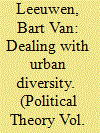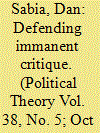| Srl | Item |
| 1 |
ID:
099571


|
|
|
|
|
| Publication |
2010.
|
| Summary/Abstract |
Intercultural citizenship seems to benefit from certain generic aspects of city life that carry a negative quality, such as "blasé attitude" or the typical "indifference" of city dwellers. The main part of this essay argues that this observation allows the formulation of a moral minimum-a threshold conception-of intercultural citizenship in the urban setting, namely, what I call side-by-side citizenship. A certain level of indifference makes possible personal freedom and a tolerant multicultural city, although there are more ideal formulations of intercultural citizenship, such as in terms of agonism or cosmopolitanism. However, these more ambitious forms easily become too demanding given the muddle of everyday urban living conditions, which tend to promote mutual reserve and impersonal social relations. A modest and realistic conception of intercultural citizenship could prove crucial in motivating citizens to act according to some minimal standards.
|
|
|
|
|
|
|
|
|
|
|
|
|
|
|
|
| 2 |
ID:
099573


|
|
|
|
|
| Publication |
2010.
|
| Summary/Abstract |
This article develops, illustrates, and defends a conception of immanent critique. Immanent critique is construed as a form of hermeneutical practice and second-order political and normative criticism. The common charge that immanent critique is a form of philosophical conventionalism necessarily committed to value relativism and to the rejection of transcultural and cosmopolitan norms is denied. But immanent critique insists that meaningful and potentially efficacious criticism must be connected to relevant criteria and understandings internal to the culture or social order at which the criticism is directed. The complaint that this demand will likely limit political and moral criticism is also denied, and the ability of immanent critique to develop from convention unconventional thinking is defended and demonstrated.
|
|
|
|
|
|
|
|
|
|
|
|
|
|
|
|
| 3 |
ID:
099570


|
|
|
|
|
| Publication |
2010.
|
| Summary/Abstract |
This essay discusses the jury's value in American democracy by examining Alexis de Tocqueville's analysis of the jury as a free school for the public. His account of jury socialization, which stressed lay deference to judges and trust in professional knowledge, was one side of a complex set of ideas about trust and authority in American political thought. Tocqueville's contemporary Francis Lieber held juries to have important competencies and to be ambivalent rather than deferential regarding court professionals. The nineteenth-century courtroom exhibited such ambivalence and was marked by institutional conflict involving increasing professional authority demanded by the bench and populist counter-pressures. Assessing the value of the jury today may require some of the conceptual tools Tocqueville offers, but must also renew an appreciation of the jury as a site that utilizes already existing juridical capabilities of lay people and thus re-conceive the relationship between lay people and court professionals.
|
|
|
|
|
|
|
|
|
|
|
|
|
|
|
|
| 4 |
ID:
099572


|
|
|
|
|
| Publication |
2010.
|
| Summary/Abstract |
Can Rawlsian theory provide us with an adequate response to the practical question of how we should proceed in the face of widespread and intractable disagreement over matters of justice? Recent criticism of ideal theorizing might make us wonder whether this question highlights another way in which ideal theory can be too far removed from our non-ideal circumstances to provide any practical guidance. Further reflection on it does not show that ideal theory is redundant, but it does indicate that there is a need for a nonideal theory that does not consist simply in an account of how to apply the principles which are yielded by ideal theory to non-ideal circumstances in the light of what is feasible and an assessment of the costs of implementation. Indeed any non-ideal theory that can adequately address this question will have to be partially autonomous, drawing on a notion of legitimacy that is rather different to the one which lies at the heart of Rawlsian ideal theory.
|
|
|
|
|
|
|
|
|
|
|
|
|
|
|
|